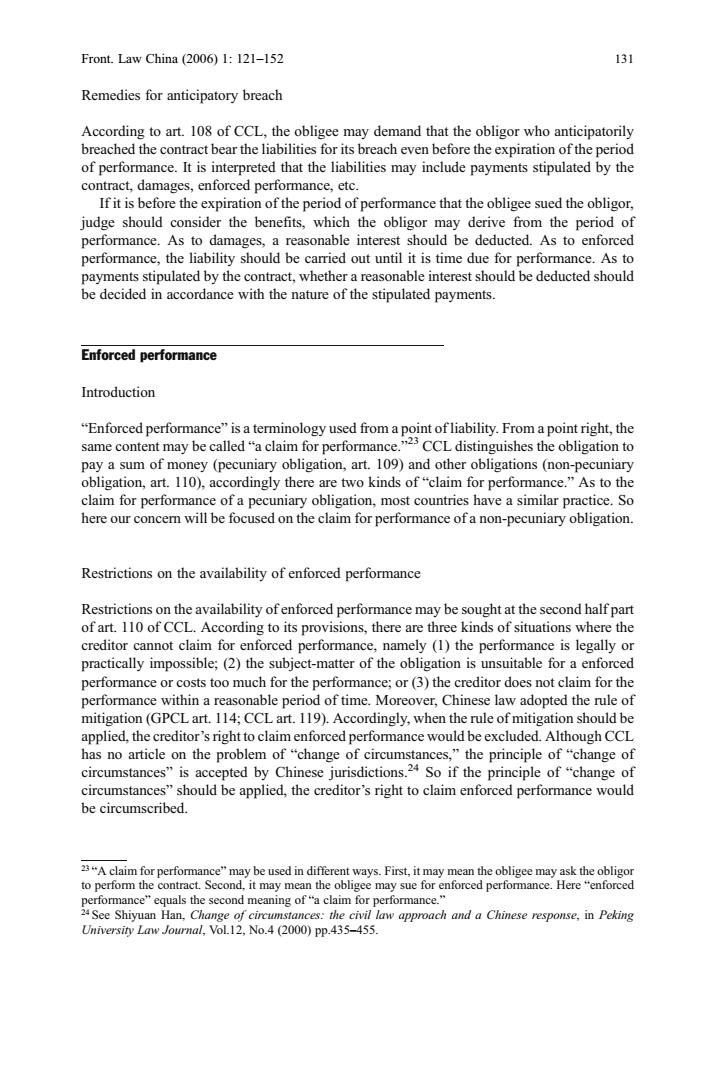正在加载图片...

Front.Law China(2006)1:121-152 131 Remedies for anticipatory breach According to art.108 of CCL,the obligee may demand that the obligor who anticipatorily breached the contract bear the liabilities for its breach even before the expiration of the period of performance.It is interpreted that the liabilities may include payments stipulated by the contract,damages,enforced performance,etc. If it is before the expiration of the period of performance that the obligee sued the obligor, judge should consider the benefits,which the obligor may derive from the period of performance.As to damages,a reasonable interest should be deducted.As to enforced performance,the liability should be carried out until it is time due for performance.As to payments stipulated by the contract,whether a reasonable interest should be deducted should be decided in accordance with the nature of the stipulated payments. Enforced performance Introduction "Enforced performance"is a terminology used from a point of liability.From a point right,the same content may be called"a claim for performance.CCL distinguishes the obligation to pay a sum of money(pecuniary obligation,art.109)and other obligations(non-pecuniary obligation,art.110),accordingly there are two kinds of"claim for performance."As to the claim for performance of a pecuniary obligation,most countries have a similar practice.So here our concem will be focused on the claim for performance of a non-pecuniary obligation. Restrictions on the availability of enforced performance Restrictions on the availability of enforced performance may be sought at the second half part of art.110 of CCL.According to its provisions,there are three kinds of situations where the creditor cannot claim for enforced performance,namely (1)the performance is legally or practically impossible;(2)the subject-matter of the obligation is unsuitable for a enforced performance or costs too much for the performance;or(3)the creditor does not claim for the performance within a reasonable period of time.Moreover,Chinese law adopted the rule of mitigation(GPCL art.114;CCL art.119).Accordingly,when the rule of mitigation should be applied,the creditor's right to claim enforced performance would be excluded.Although CCL has no article on the problem of"change of circumstances,"the principle of"change of circumstances"is accepted by Chinese jurisdictions.24 So if the principle of"change of circumstances"should be applied,the creditor's right to claim enforced performance would be circumscribed. 2"A claim for performance"may be used in different ways.First,it may mean the obligee may ask the obligor to perform the contract.Second,it may mean the obligee may sue for enforced performance.Here "enforced performance"equals the second meaning of"a claim for performance." See Shiyuan Han,Change of circumstances:the civil law approach and a Chinese response,in Peking University Law Journal,Vol.12,No.4 (2000)pp.435-455.Remedies for anticipatory breach According to art. 108 of CCL, the obligee may demand that the obligor who anticipatorily breached the contract bear the liabilities for its breach even before the expiration of the period of performance. It is interpreted that the liabilities may include payments stipulated by the contract, damages, enforced performance, etc. If it is before the expiration of the period of performance that the obligee sued the obligor, judge should consider the benefits, which the obligor may derive from the period of performance. As to damages, a reasonable interest should be deducted. As to enforced performance, the liability should be carried out until it is time due for performance. As to payments stipulated by the contract, whether a reasonable interest should be deducted should be decided in accordance with the nature of the stipulated payments. Enforced performance Introduction “Enforced performance” is a terminology used from a point of liability. From a point right, the same content may be called “a claim for performance.” 23 CCL distinguishes the obligation to pay a sum of money (pecuniary obligation, art. 109) and other obligations (non-pecuniary obligation, art. 110), accordingly there are two kinds of “claim for performance.” As to the claim for performance of a pecuniary obligation, most countries have a similar practice. So here our concern will be focused on the claim for performance of a non-pecuniary obligation. Restrictions on the availability of enforced performance Restrictions on the availability of enforced performance may be sought at the second half part of art. 110 of CCL. According to its provisions, there are three kinds of situations where the creditor cannot claim for enforced performance, namely (1) the performance is legally or practically impossible; (2) the subject-matter of the obligation is unsuitable for a enforced performance or costs too much for the performance; or (3) the creditor does not claim for the performance within a reasonable period of time. Moreover, Chinese law adopted the rule of mitigation (GPCL art. 114; CCL art. 119). Accordingly, when the rule of mitigation should be applied, the creditor’s right to claim enforced performance would be excluded. Although CCL has no article on the problem of “change of circumstances,” the principle of “change of circumstances” is accepted by Chinese jurisdictions.24 So if the principle of “change of circumstances” should be applied, the creditor’s right to claim enforced performance would be circumscribed. 23 “A claim for performance” may be used in different ways. First, it may mean the obligee may ask the obligor to perform the contract. Second, it may mean the obligee may sue for enforced performance. Here “enforced performance” equals the second meaning of “a claim for performance.” 24 See Shiyuan Han, Change of circumstances: the civil law approach and a Chinese response, in Peking University Law Journal, Vol.12, No.4 (2000) pp.435–455. Front. Law China (2006) 1: 121–152 131